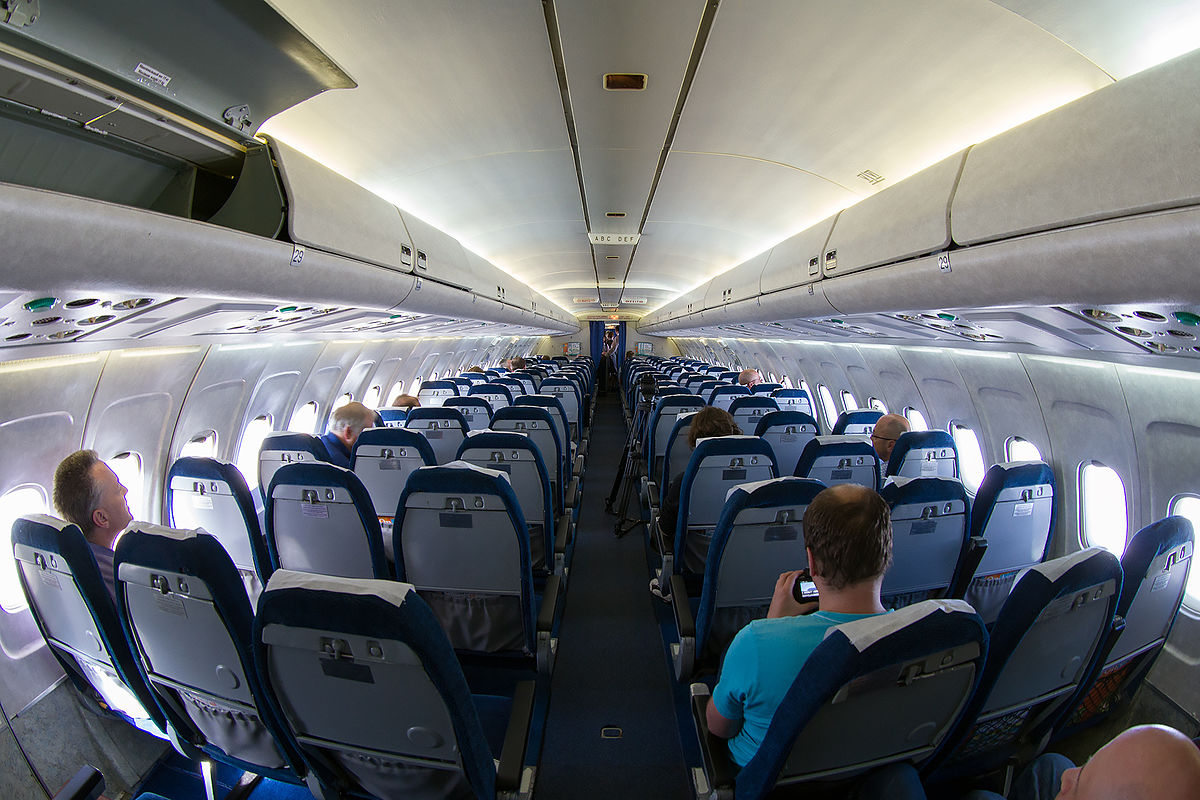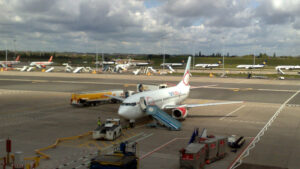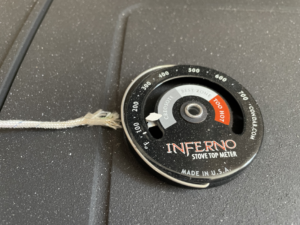A few weeks ago, I found myself the victim of flights from hell. My first flight was cancelled, leaving me driving home late at night, only to wake again for a red-eye the next morning. That was cancelled as well, with the second replacement delayed by a further hour. All in all I ended up spending a good ten hours extra in the airport surrounded by tired, sick, and coughing individuals, and ended up a full 16 hours late to my destination. On the return, I’d again tangle with delays, and by the weekend’s close, I’d contracted a nasty flu for my trouble.
All this had me riled up and looking for revenge. I had lost hours of my life to these frustrations, and the respiratory havoc claimed a further week of my working life. It had me realizing that we could surely improve the performance and hygiene of our airliners with a simple idea: a website called Flights From Hell.
Clean Up Your Act
The concept of Flights From Hell is simple. Let’s say you catch a flight, get home, and the next day, you realize you caught something from the plane. You point your browser at Flights From Hell, and punch in your flight number, departure time, and your seat allocation in the plane. You then log what you think you caught on the plane, be it COVID-19, the flu, the common cold, or whatever. Ideally, thousands of passengers on thousands of flights will do the same, and it could all be tied up in a neat little bow by hooking it up with already-existing flight data APIs.
So far, so simple, right? But there’s a magic to it. First things first, it becomes a useful tool for tracking the spread of airborne diseases. Imagine finding a single hot flight from Chicago to Dallas Fort Worth, and then looking at how infected passengers then spread communicable diseases all over the country on their connecting flights. There’s potential value in this from a disease control perspective.

More so, though, it could be used as a agitating tool to improve air travel. Monthly statistics could be collated to determine the routes, airports, airplanes, and airlines most likely to get you sick. Maybe sitting in a 737 by the emergency exit is a particular hotspot for catching something. Maybe a certain airline performs poorly, and routinely sees more passengers getting off ill than its rivals.
Suddenly, there’s another factor at play when you’re booking your next flight. In the back of your mind, you’re thinking that the budget carrier you usually use just got a really bad rating last month on Flights From Hell. Checking the site, you note that you’re eight times less likely to get sick with a rival carrier based on past performance.
It almost doesn’t matter whether the site’s stats are a perfect predictor or not; put the data out there, and it will influence people’s decision making. Suddenly, this creates a profit motive for airlines. If they’re routinely losing ticket sales because their stats are so poor on Flights From Hell, that’s no good. Someone upstairs better come up with a plan on how to fix the problem. Maybe it’s better air filters, or a change to ventilation settings. Maybe it’s better surface cleaning practices in between flights.

In this world, the airlines are forced to compete on hygiene because the data is out there. You’ll see ads with smiling flight attendants touting the value of cleaner air and healthier flights. Airlines with a good record will boast about how thousands fewer passengers got sick on their flights versus their rivals on the same routes. At the extreme, airlines might even get serious about stopping obviously sick passengers from boarding a flight.
Of course, building a better world won’t necessarily be easy. The whole concept depends on users taking the time to submit data to a website. For those in the depths of a nasty head cold, that’s perhaps less likely unless they’re feeling particularly vitriolic towards the airline. There’s also the problem of data verification. A valid boarding pass or ticket is plenty to prove you caught a flight, but how do you prove you got sick there? Even if you’re not proving you got sick on the flight, just proving to a website you’re actually sick at all is a difficult thing to do. Photos of RAT tests can readily be faked, after all, and nobody’s going to drag themselves to a doctor for an “official test” just to help out a community project with some data collection.
Ultimately, it’s an idea with promise, but flaws. In any case, as I struggle to recover from the worst flu of my life, I just here lamenting the fact that I didn’t book with a different airline. Until Flights From Hell (HellFlights? Flightsi?) gets built, I just wish I had some way to tell the world the fate that befell me that frustrating weekend.
- SEO Powered Content & PR Distribution. Get Amplified Today.
- PlatoData.Network Vertical Generative Ai. Empower Yourself. Access Here.
- PlatoAiStream. Web3 Intelligence. Knowledge Amplified. Access Here.
- PlatoESG. Carbon, CleanTech, Energy, Environment, Solar, Waste Management. Access Here.
- PlatoHealth. Biotech and Clinical Trials Intelligence. Access Here.
- Source: https://hackaday.com/2023/12/06/ask-hackaday-could-rating-airlines-stop-flights-from-spreading-diseases/
- :is
- :not
- $UP
- 1
- 120
- 16
- 167
- 75
- a
- About
- actually
- Ads
- After
- again
- ago
- AIR
- air travel
- airline
- Airlines
- Airplanes
- airport
- Airports
- All
- allocation
- almost
- also
- an
- and
- Another
- any
- APIs
- ARE
- AS
- ask
- At
- Attendants
- back
- Bad
- based
- BE
- because
- becomes
- Better
- between
- boarding
- book
- booking
- browser
- budget
- Building
- built
- but
- by
- called
- CAN
- case
- Catch
- caught
- certain
- change
- checking
- chicago
- claimed
- cleaner
- Cleaning
- Close
- cold
- collection
- come
- Common
- community
- compete
- concept
- Connecting
- control
- could
- country
- course
- COVID-19
- creates
- credit
- Dallas
- data
- day
- decision
- Decision Making
- Delayed
- delays
- departure
- depends
- Depths
- destination
- Determine
- different
- difficult
- Disease
- diseases
- do
- Doctor
- Doesn’t
- driving
- easy
- emergency
- ended
- Ether (ETH)
- Even
- Exit
- extra
- extreme
- fact
- factor
- Fall
- far
- fate
- feeling
- few
- fewer
- filters
- finding
- First
- Fix
- flaws
- flight
- Flights
- For
- Fort
- found
- from
- frustrating
- Frustrations
- full
- further
- get
- getting
- going
- good
- got
- had
- head
- healthier
- help
- here
- Home
- HOT
- Hotspot
- hour
- HOURS
- How
- How To
- HTTPS
- i
- idea
- ideally
- if
- imagine
- improve
- in
- individuals
- influence
- IT
- ITS
- jpg
- just
- Last
- Late
- least
- leaving
- less
- Life
- likely
- little
- log
- looking
- losing
- lost
- magic
- Making
- Matter
- max-width
- maybe
- me
- might
- mind
- Month
- monthly
- more
- morning
- most
- my
- myself
- Neat
- necessarily
- next
- night
- no
- note
- number
- of
- off
- on
- only
- or
- Other
- our
- out
- over
- particular
- particularly
- parts
- pass
- past
- people’s
- perfect
- performance
- performs
- perhaps
- perspective
- Photos
- pick
- plan
- plane
- plato
- Plato Data Intelligence
- PlatoData
- Play
- Plenty
- Point
- poor
- potential
- practices
- Predictor
- Problem
- Profit
- project
- promise
- Prove
- proving
- punch
- put
- RAT
- rating
- readily
- realize
- realizing
- really
- record
- Recover
- replacement
- return
- right
- Rival
- rivals
- routes
- routinely
- sales
- same
- say
- Second
- see
- seeing
- sees
- serious
- settings
- Simple
- single
- site
- Sitting
- So
- some
- Someone
- something
- Spending
- spread
- Spreading
- statistics
- stats
- Stop
- stopping
- Struggle
- submit
- suggest
- surely
- Surface
- surrounded
- SVG
- taking
- tell
- ten
- tests
- than
- that
- The
- the world
- their
- themselves
- then
- There.
- These
- thing
- things
- think
- Thinking
- this
- those
- though?
- thousands
- ticket
- ticket sales
- Tied
- time
- times
- tired
- to
- tool
- towards
- Tracking
- travel
- trouble
- until
- upstairs
- use
- used
- users
- usually
- valid
- value
- Verification
- Versus
- Victim
- Wake
- was
- Way..
- we
- Website
- week
- weekend
- Weeks
- WELL
- What
- whatever
- when
- whether
- whole
- will
- with
- working
- world
- Worst
- worth
- you
- Your
- zephyrnet












